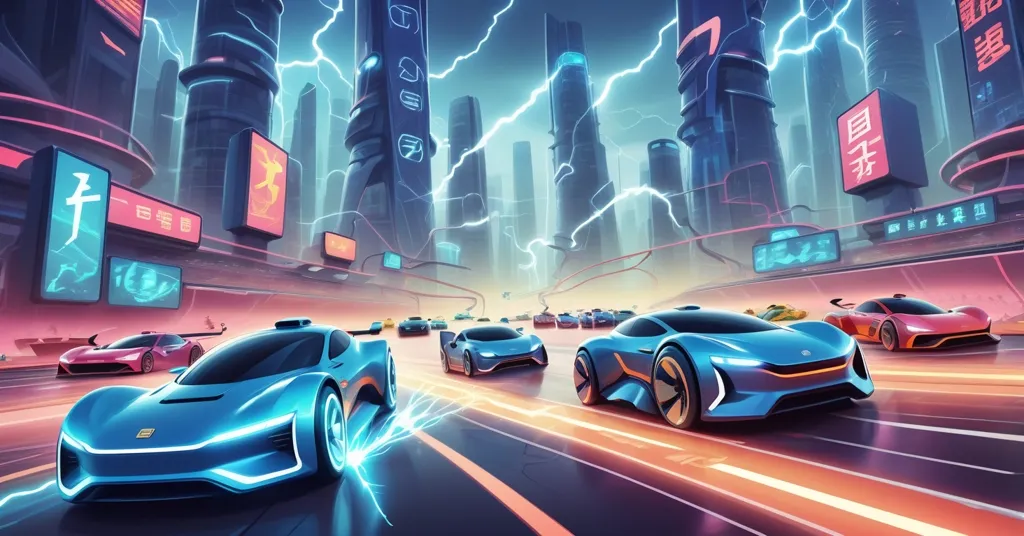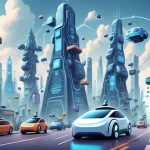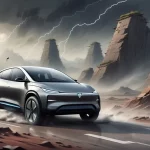Tesla’s China Market Share Crashes to 4%: Elon Musk Faces Brutal Competition

Tesla’s Market Share in China Plunges to 4%: A Brutal Wake-Up Call for Elon Musk
Tesla’s grip on China’s electric vehicle (EV) market, once a stronghold as its second-largest territory, has crumbled to a pitiful 4% share, down from 11% in early 2021, with sales nosediving 30% year-over-year in May. As domestic titans like BYD command 29% of the market and newcomers like Xiaomi dazzle with feature-packed rides, Elon Musk’s empire is getting schooled in a region it can’t afford to lose.
- Sales Collapse: Tesla moved under 40,000 vehicles in China in May, a 30% drop from over 57,000 the prior year.
- Competitor Surge: BYD dominates with 29% market share, while Tesla’s offerings feel outdated to local buyers.
- Regulatory Walls: Full Self-Driving (FSD) tech is stalled by China’s strict data laws, hobbling Tesla’s edge.
The Hard Numbers: Tesla’s China Sales Implosion
The stats don’t lie, and for Tesla, they’re a punch to the gut. Selling fewer than 40,000 vehicles in May compared to over 57,000 the year before isn’t just a slump—it’s a freefall. Meanwhile, China’s EV and plug-in hybrid market is booming, with overall demand surging. This isn’t a market problem; it’s a Tesla problem. Local giants like BYD, holding a staggering 29% share, and even tech interloper Xiaomi are running circles around Tesla with vehicles that cater to Chinese consumers’ love for in-car tech. We’re talking built-in gaming consoles, selfie cameras, mini-fridges, and multiple screens—features that make Tesla’s stark, minimalist dashboards look like a flip phone in a smartphone era. Local buyers are calling Tesla’s designs “tired,” and frankly, they’ve got a point, as highlighted in discussions on EV competition forums.
Then there’s the price sting. Tesla’s entry-level Model Y starts at $36,700, which might sound competitive until you glance at BYD’s Sealion 07, priced at a wallet-friendly $26,400. That’s a chasm no amount of brand cachet can close, especially when BYD’s cars come stacked with extras Tesla seems to actively avoid. This isn’t news to Tesla’s China team either. Since 2021, with repeated warnings in 2023 and 2024, local staff have been sounding the alarm to headquarters about the need for better smartphone integration and native apps to match rivals. The response from U.S. execs? A dismissive wave-off, labeling these demands as “non-priorities.” Ignoring the world’s biggest EV market isn’t strategy; it’s sheer arrogance, a trend underscored by recent sales data comparisons.
The fallout is hitting the ground level hard. A Beijing-based Tesla salesman revealed that sales targets have spiked from four cars a week to one per day, with shifts stretching from 10 to 12 grueling hours. That’s not a job; that’s a meat grinder. Yet even this desperate push isn’t moving the needle. Elon Musk himself admitted the heat during an analyst call, and his words carry a rare whiff of unease.
“I’m a little concerned that on the leaderboard, ranks two through 10 will be Chinese companies.” – Elon Musk
Tech Lag: Tesla Missing the Innovation Race
Musk has every reason to sweat. Tesla isn’t just bleeding on price and features; it’s getting outflanked on the cutting edge of tech. Take Full Self-Driving (FSD), Tesla’s flagship autonomous driving system, rolled out in the U.S. since early 2024. For those unfamiliar, FSD aims for full vehicle autonomy—no human input needed—relying on cameras and artificial intelligence to navigate roads. It’s a bold vision, but in China, it’s a non-starter. Strict regulations demand that AI systems like FSD train on data processed within China’s borders, a rule tied to privacy laws like the Personal Information Protection Law (PIPL). Simply put, Tesla can’t ship its global data model over and expect a green light. When the company tried to push FSD features through over-the-air updates with a free trial, Chinese officials shut it down with a scathing rebuke, as detailed in reports on FSD regulatory challenges.
“Shouldn’t use drivers as guinea pigs.” – Chinese regulators
That’s not just a slap on the wrist; it’s a public humiliation. Meanwhile, domestic competitors aren’t waiting around. Companies like XPeng with its XNGP system, BYD’s “Eyes of God” tech, Baidu, and Pony AI are already deploying FSD-like systems and even robotaxi fleets. For the uninitiated, robotaxis are driverless cabs—think a taxi with no human behind the wheel, ferrying passengers via AI. These are live on Chinese streets today, while Tesla can’t even get permission to test, a struggle explored in recent FSD user experiences. It’s a stark contrast to the early days when China rolled out the red carpet for Tesla with land deals, tax breaks, and the rare privilege of operating solo without a local partner. That romance is dead. Relations with officials have chilled, and Musk’s once-towering influence as a U.S.-China connector is fading fast. A meeting with China’s Vice President Han Zheng in Washington earlier this year, where Musk was reportedly nudged to aid bilateral ties, went nowhere, as noted in analysis of U.S.-China tech tensions. Why play diplomat when your company’s getting iced out?
Regulatory and Geopolitical Quagmire
China’s regulatory fortress isn’t Tesla’s only headache; the broader U.S.-China clash is tightening the screws. Tensions over everything from U.S. export bans on advanced chips to data privacy spats mean Tesla’s tech-heavy ambitions—think AI-driven autonomy—are caught in a geopolitical crossfire. China’s insistence on local data processing isn’t just bureaucracy; it’s a national security stance, rooted in laws designed to keep sensitive info out of foreign hands. Tesla’s global AI training model, built on data aggregated worldwide, clashes head-on with this framework. Until Tesla can localize its tech stack or strike a data-sharing deal, FSD and similar innovations are dead in the water here, a point reinforced by insights into China’s EV market trends.
This isn’t theoretical—it’s a tangible drag. Without FSD, Tesla can’t compete with XPeng’s seamless urban navigation systems or Baidu’s sprawling robotaxi networks. And it’s not just autonomy; even smaller software updates are getting blocked, leaving Tesla’s cars feeling like relics compared to Xiaomi’s EVs, which integrate everything from social media apps to in-car karaoke. Tesla’s refusal to adapt to these local quirks is less a principled stand and more a stubborn misstep, especially in a market that values tech flair over raw horsepower, a sentiment echoed in discussions on Tesla’s declining reputation.
Beyond EVs: Tesla’s Wider Ventures Under Siege
The pain isn’t confined to cars. Tesla’s bigger bets are also hitting Chinese roadblocks. Its Megapack battery business, a cornerstone of energy storage, is facing heat from CATL, a Chinese battery behemoth making inroads in markets like Australia. Then there’s Optimus, Tesla’s humanoid robot project, a futuristic pitch straight out of sci-fi. The catch? It leans heavily on Chinese parts and suppliers. Those same suppliers are now buddying up with local robotics startups like Unitree and Agibot, who are thrilled to ride Tesla’s coattails. Chen Feng, a marketing manager at a Tesla supplier, laid it bare.
“Once you secure contracts with Tesla, domestic robotics companies will be much more willing to collaborate with you.” – Chen Feng
In other words, Tesla’s paving the way for its own rivals. Musk, the disruption king, is caught in a cycle where his innovation fuels the very players outmaneuvering him. It’s a bitter twist, especially when you consider how Tesla’s Shanghai Gigafactory once symbolized a win-win with China, a dynamic rooted in the broader context of China’s automotive industry. Now, it’s a stark reminder of how quickly fortunes flip when you underestimate local grit.
Decentralized Solutions: Could Blockchain and Crypto Save Tesla?
Let’s pivot to a wild card that ties into our passion for decentralization. Tesla’s data woes with Chinese regulators could be a golden opportunity to lean into blockchain tech. Imagine a decentralized ledger system for vehicle data—transparent, secure, and compliant with local laws by keeping sensitive info verifiable yet private. Blockchain could let Tesla prove it’s not siphoning data abroad, potentially cracking open the door for FSD approval. It’s not far-fetched; decentralized identity systems are already being explored in other industries to tackle privacy concerns. Why not EVs?
Then there’s the financial angle. Musk toyed with Bitcoin payments for Tesla purchases back in 2021 before backtracking over environmental concerns. With China’s underground crypto adoption still thriving despite bans, why not revisit Bitcoin as a payment option or loyalty perk to stand out? Sure, we’re Bitcoin maximalists at heart, but even altcoins like Ethereum could play a role with smart contracts for vehicle ownership or leasing. This isn’t just gimmickry—it’s a nod to effective accelerationism, speeding up EV adoption through radical financial and tech innovation. Tesla differentiating itself via crypto could be the jolt it needs to recapture China’s tech-savvy crowd.
A Silver Lining Amid the Wreckage?
Before we write Tesla off, let’s acknowledge its knack for defying odds. Globally, it clawed back the top EV seller spot in Q1 2024 with 386,810 units delivered, outpacing BYD despite China’s drag. Musk’s broader empire, with SpaceX’s projected $400 billion valuation, gives him deep pockets to fund a China comeback through R&D or aggressive marketing. And don’t sleep on Cybercab, Tesla’s autonomous vehicle project ramping up at Giga Texas with a potential 2026 rollout. If regulatory knots loosen, that could be a robotaxi contender to rival Baidu’s fleets.
Historically, Tesla has turned skepticism into fuel—think back to the early days when EVs were a punchline, and Musk still built a juggernaut. China’s a brutal test, no doubt, but it’s not game over. Still, recovery hinges on adapting to local tastes and navigating the geopolitical minefield, not just banking on global clout. If Musk keeps playing the stubborn cowboy, Tesla risks becoming a relic in a market shaping the future of transport. Is this a sign that centralized tech giants can’t match the agility of localized, disruptive innovation? That’s the million-dollar question.
Key Takeaways and Questions for Reflection
- What’s Driving Tesla’s Market Share Drop to 4% in China?
A 30% sales plunge in May, with under 40,000 units sold, stems from fierce competition by BYD (29% share) and Xiaomi, whose tech-loaded EVs outshine Tesla’s dated designs and pricier tags like the Model Y at $36,700 versus BYD’s Sealion 07 at $26,400. - How Are Chinese Rivals Outpacing Tesla in EV Tech?
XPeng, Baidu, and Pony AI are rolling out autonomous systems and robotaxi fleets on Chinese roads, while Tesla’s Full Self-Driving tech is stuck behind data localization laws, unable to deploy or update. - Why Are Regulatory Barriers Crippling Tesla in China?
China’s strict rules, like the Personal Information Protection Law, require local data processing for AI, blocking Tesla’s FSD rollout and rejecting over-the-air updates as unsafe for drivers. - Could Blockchain and Crypto Offer Tesla a Lifeline?
Blockchain could secure vehicle data transparently to meet regulatory demands, while Bitcoin payments or Ethereum smart contracts might attract China’s crypto-curious buyers, giving Tesla a decentralized edge. - Are Tesla’s Other Ventures Threatened by Chinese Competition?
Yes, Megapack batteries face CATL’s push in markets like Australia, and Optimus robots indirectly boost local startups through shared supply chains, turning Tesla’s innovation into a rival’s stepping stone.



